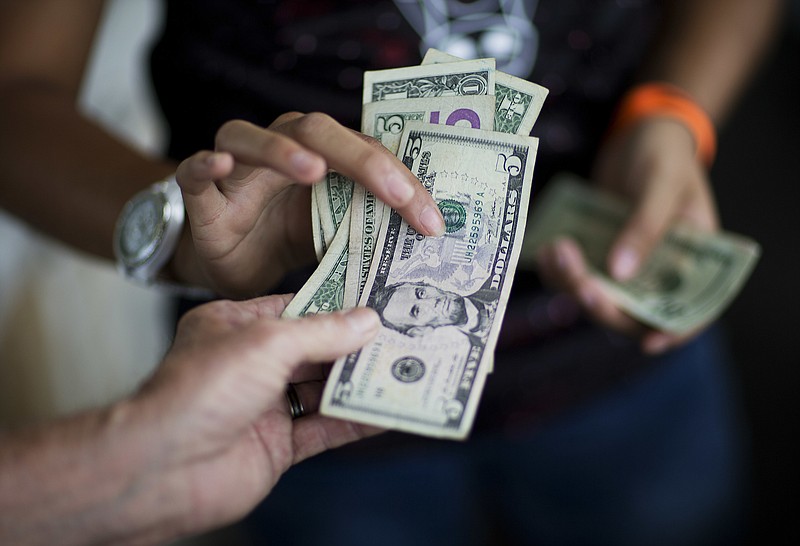It's the economy, stupid.
On Nov. 8, Americans will vote, and when they vote they will choose between an economy that works for everyone or an economy that benefits the rich at the expense of everyone else.
When you strip away all of the other issues - talked about and not talked about - in this year's presidential and congressional campaigns, our 2016 election boils down to this: Our economy determines everything. Safety, security, education, income equality, race and human relations, health, recreation - everything.
And the choice is pretty clear.
Hillary Clinton is for a trickle-up economy. Make it easy for Americans to find good jobs and everything else gets a boost.
Donald Trump is for a trickle-down economy. Cut taxes for the rich and jobs will follow. But that trickle-down stuff didn't work for Ronald Reagan or anyone else since, and it won't work now.
Conservatives always predict stalled economies and general disaster from trickle-up economics. They're quick to claim that tax hikes for the rich "job creators" will become "job killers." But that hasn't been the lesson of the past eight years under a Democratic administration.
As New York Times columnist Paul Krugman recently noted, "President Barack Obama is no socialist, but since his re-election he has presided over a significant rise in taxes on high incomes. In fact, the top one percent is now paying about the same share of its income in federal taxes as it did in 1979, before Ronald Reagan began the era of big tax cuts for the rich."
Also on Obama's watch, we've seen the best job growth since the 1990s. And although Fox News tells us Americans are angry because they aren't feeling recovered, that's because it took eight years to turn the corner from the damage the previous Republican administrations caused that led us to the 2008 Great Recession.
Finally, in 2015, middle-class families got their biggest pay raises in 50 years, when median household income rose 5.2 percent when adjusted for inflation.
Pause a moment and think about that - the biggest raise in 50 years. And still it didn't bring most of us back to where we'd been before the recession.
Census research also shows that in 2015, America saw less poverty. Some 3.5 million fewer Americans were living in poverty than the year before, a 1.2 percent decline. That seems minuscule, yet it's the biggest drop we've seen since 1968. And a big part of that poverty drop may well have been that another 4 million people gained health insurance thanks to the Affordable Care Act. Figures show that the nation's uninsured rate has dropped to 9.1 percent, the lowest level since before the Great Recession.
And did we mention jobs? Since early 2010, we've added more than 15 million new ones - despite those "job-killer" higher taxes for the so-called "job creators." At the same time, the unemployment rate has declined to 4.9 percent - half what it was seven years ago. All three major stock indices hit record highs in August, home foreclosures have dropped and (barring more pipeline leaks) our cheap gasoline prices are expected to continue falling into 2017.
That's quite the turnaround from the economic free-fall this nation found itself in at the end of the last Republican administration.
But even if Clinton wrests the White House away from Don the Con, we're not out of the woods yet. She'll have to persuade Congress to pass her plan that calls for wealthy Americans to pay higher taxes and businesses to face tax rules that make it less advantageous to relocate overseas. The money those changes would produce would go to fund child care, better education and jobs-building infrastructure improvements for roads, bridges and energy.
Yes, Americans are right to feel they haven't completely recovered. Along the way to recovery, the cost of housing and the cost of prescription drugs have climbed as though there never was a recession. Some 11.4 million American households - nearly twice the entire population of Tennessee - spend more than half their incomes on rent.
And while we have many new jobs, they are not all good-paying jobs.
We have to make our economic growth "strong, fair and lasting," Clinton said in an op-ed column she wrote last week for The New York Times.
Trump, on the other hand, offers a smoke-and-mirrors plan for tax cuts - one that even the conservative-leaning Tax Foundation's analysis concluded could reduce federal revenue by up to $5.9 trillion over the next decade. The analysis found that even if it results in new jobs to offset the revenue losses (as Trump claims), it would still add more than $3.9 trillion to the national debt over that time.
It's noteworthy that the expected Trump debt is about 10 times what is forecast by a similar analysis of Clinton's tax plan, according to the Tax Foundation.
And who benefits under the Trump plan? The Tax Foundation analysis showed that the largest beneficiaries are the rich at the top of the income distribution. As you might expect, much of the savings in his revised plan came from reducing the size of tax cuts for low- and middle-income earners.
Slate Magazine put it this way: Trump's tax cuts are "a multitrillion-dollar gift to the rich" and "utterly worthless to the middle-class."
It's simple math. This election is about dollars and sense. Trump only knows how to grow one bottom line - his own. We need to support ours.
